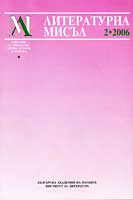Властта в семейството. Версии на патриархалното господство (наблюдения върху фолклорни модели и възрожденски текстове)
Power and Family. Aspects of Patriarchal Authority
(Observations on Folklore Models and Bulgarian Revival Literature Texts)
Author(s): Maria IlchevskaSubject(s): Customs / Folklore
Published by: Институт за литература - БАН
Keywords: Power; family; Bulgarian national revival; folklore; literature
Summary/Abstract: The text sets out to examine the transformation of folklore and mythological family patterns in the literature of the Bulgarian national revival, concentrating its interest on the way different power and leadership models intertwine throughout this process. The attention is focused on the mechanisms of authority-display, arranged on several levels of power constructions.The first one considers family from an optimistic and utopian point of view. Family is interpreted as a hierarchical structure of subordinations which follow the model of Universal order. The conclusion is that through the sacred comprehension of marriage, through its interpretation as a secular correspondence of the sacred archetype, the matrimonial institution is accepted as an irrevocable stage of the personal development, as a compulsory element of everyone’s socialization. The general perception is that relations in family are governed by love, affection, harmony and mutuality.Observing the general line of interpreting power simultaneously as authority, influence, arresting magnetism, on the one hand, and as domination, supremacy, oppression, tyranny, control, on the other, the text unfolds the next aspect of power-roles distribution in the family. The second part concentrates on the pragmatic and realistic uses of power. The attention is focused on the problem of the split symmetry - inequality in family relations. The turns start when the sacred archetype passes through all degrees of desacralization, when authority converts into a form of property - of one person over the other. The profane aspect of the male-female relations debases the “high” concepts and degrades the elevated values to a degree of general negation. The third part examines family as a manifestation of coercion, force, anger, violence and outrage. It turns out that the general moral standards and the noble rules of behaviour are not able to control the mighty world of savage selfishness; that culture and love are defeated and shattered by destructive instincts. The symbolic imagery of marriage is presented by a full-toned scale of evil. Family turns into a total collapse of the social contract.
Journal: Литературна мисъл
- Issue Year: 2006
- Issue No: 2
- Page Range: 71-89
- Page Count: 19
- Language: Bulgarian
- Content File-PDF

